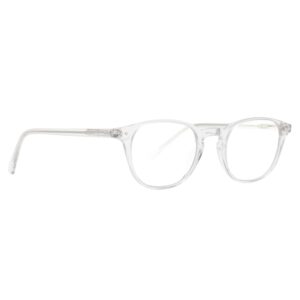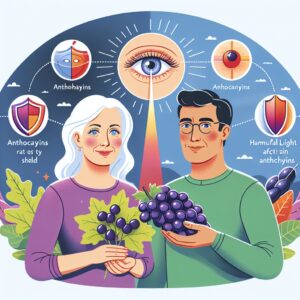
Key Takeaways
- Blue light from digital screens can strain eyes, but plant-based supplements may offer protection.
- Lutein and Zeaxanthin are vital nutrients for eye health, commonly found in leafy greens.
- Astaxanthin, another powerful antioxidant, supports eye health and can be sourced from algae.
- Choosing the right vegan blue light supplement involves checking for key ingredients and certifications.
- Consistent intake of vegan eye supplements, along with a balanced diet, may improve eye health over time.
Decoding Blue Light: Why It Matters for Vegans
Blue light is everywhere, and it’s not just coming from the sun anymore. Our modern lives have us staring at screens more than ever before, and that’s a problem for our eyes. But why should vegans, in particular, be concerned? Well, because the nutrients that are most effective in combating blue light damage are often found in animal products. So, if you’re living a plant-based lifestyle, you need to be extra mindful about protecting your eyes.
The Vegan Eye Health Dilemma
As a vegan, you might be missing out on certain nutrients that are crucial for eye health. These nutrients, like Omega-3 fatty acids, Vitamin B12, and certain proteins, are abundant in animal products but less so in plant-based foods. This is where supplements come into play, specifically those designed to defend against blue light.
Understanding Blue Light’s Impact on Vision
Let’s get to the point. Blue light is a type of light with a very short wavelength, which means it’s high-energy. It’s emitted by the sun, LED lighting, and the screens of our electronic devices. Why does this matter? Because prolonged exposure to blue light can lead to eye strain, fatigue, and even long-term damage to your vision. As a vegan, it’s essential to find plant-based solutions to this modern-day problem.
Vegan-Friendly Ingredients for Blue Light Defense
So, what should you look for in a vegan eye supplement? The most important ingredients are Lutein and Zeaxanthin, two powerful antioxidants that are naturally found in the macula of the eye. They’re like sunglasses for your retina, filtering out harmful blue light. The good news is, they can be sourced from plants!
Nature’s Armor: Lutein and Zeaxanthin
Lutein and Zeaxanthin are often hailed as the heroes of eye health. They’re found in high concentrations in leafy greens like kale and spinach. But let’s face it, not everyone eats their veggies every day. That’s where supplements come in handy. Look for vegan capsules that contain at least 20 mg of Lutein and 4 mg of Zeaxanthin to match the daily intake recommended by studies.
The Power of Astaxanthin
Astaxanthin is another antioxidant that’s been making waves in the world of eye health. It’s a carotenoid, like Lutein and Zeaxanthin, but it’s sourced from microalgae, making it a perfect fit for vegans. It’s been shown to help reduce eye strain and fatigue, so it’s a great addition to any blue light defense strategy.
But that’s not all. Besides these antioxidants, Bilberry extract is another ingredient that’s worth your attention. Let’s dive into why this little berry can make a big difference in your eye health.
Bilberry Extract: An Underestimated Ally
Bilberry, a cousin of the blueberry, has been used for ages to support eye health. It’s rich in anthocyanins, which are known to help improve night vision and reduce eye fatigue. When you’re looking at vegan eye health supplements, don’t overlook this powerful little berry.
Research Highlights
Recent studies have shown a positive correlation between the intake of Lutein and Zeaxanthin and the reduction of blue light damage. For instance, a study published in the Journal of the American Optometric Association suggests that these carotenoids help improve visual performance and reduce glare disability. It’s clear that these nutrients are essential, but the question for vegans is how to obtain them effectively through supplements.
Case Studies: Vegan Capsules in Action
Consider the case of a vegan digital artist who experienced reduced eye strain after incorporating a plant-based Lutein and Zeaxanthin supplement into her daily routine. Another instance is a vegan software developer who found that adding Astaxanthin to his regimen helped alleviate his dry eyes, commonly caused by prolonged screen time. These anecdotes align with clinical research, underscoring the potential benefits of vegan eye health supplements.
Are All Vegan Eye Capsules Created Equal?
Not all vegan eye health supplements are created equal. While many may list Lutein, Zeaxanthin, and Astaxanthin as ingredients, the concentration and source of these nutrients can vary widely. It’s crucial to examine the labels closely to ensure you’re getting a potent and pure product.
Key Components for Effectiveness
When choosing a vegan eye health supplement, look for a few key components. First, ensure that the product is indeed 100% vegan by checking for certifications like the Vegan Society trademark. Next, verify the dosage of Lutein and Zeaxanthin; they should be present in clinically effective amounts. Lastly, check the purity of the ingredients to ensure they’re free from contaminants and fillers that might dilute their efficacy.
Additionally, consider the form of the supplement. Some studies suggest that the bioavailability of these nutrients can be higher in softgel form compared to tablets, potentially making them more effective.
For example, a high-quality vegan eye health supplement might contain:
- 20 mg of Lutein
- 4 mg of Zeaxanthin
- 4 mg of Astaxanthin
All sourced from non-GMO, organic plants and encapsulated in a vegan softgel for optimal absorption.
It’s also worth noting that the inclusion of Bilberry extract, while less common, can be a sign of a well-rounded eye health supplement, providing additional antioxidants that support night vision and reduce eye fatigue.
Comparing Top Market Options
When we look at the top market options for vegan eye health supplements, a few stand out. For instance, some brands prioritize organic ingredients and provide a transparent supply chain, which can be reassuring for those concerned about the origins of their supplements. Other brands might offer a unique blend of additional antioxidants or herbs that support overall eye health.
But remember, the most important factor is the presence of clinically significant amounts of Lutein, Zeaxanthin, and Astaxanthin. These are the nutrients that have been shown to have the most impact on protecting the eyes from blue light.
Integrating Supplements into a Vegan Lifestyle
Incorporating eye health supplements into a vegan lifestyle should be done thoughtfully. Always start by reading the label to ensure the product aligns with your dietary values. Then, consider how the supplement fits into your overall nutrition plan.
Most importantly, remember that supplements are just that—a supplement to your diet, not a replacement for healthy eating habits. A well-rounded vegan diet rich in fruits, vegetables, nuts, and seeds is the foundation of good eye health.
Timing and Dosage for Maximum Benefits
To get the most benefit from your vegan eye health supplements, timing and dosage are key. Take your supplements with a meal that includes a source of healthy fat, like avocado or nuts, to improve the absorption of these fat-soluble nutrients. Stick to the recommended dosage on the label, as this is usually based on clinical research.
Diet and Lifestyle: Complementary Practices for Eye Health
Besides taking supplements, there are other practices you can adopt to support your eye health. For example, ensure you’re getting enough sleep, practice regular eye exercises, and take breaks from screens to reduce eye strain. Hydration and avoiding smoking are also crucial for maintaining healthy eyes.
The Verdict on Vegan Blue Light Eye Capsules
After reviewing the evidence and considering the unique needs of vegans, it’s clear that plant-based blue light supplements can be an effective way to protect eye health. With the right combination of ingredients, dosage, and lifestyle habits, vegans can mitigate the harmful effects of blue light and maintain optimal vision.
Ultimately, while vegan eye health supplements are a valuable tool, they work best as part of a holistic approach to wellness that includes a balanced diet, regular exercise, and proper eye care habits.
Summarizing the Evidence
When it comes down to it, the evidence is clear: the antioxidants Lutein, Zeaxanthin, and Astaxanthin play a significant role in protecting our eyes from the high-energy blue light emitted by screens and the sun. Scientific studies have repeatedly shown that these nutrients can help reduce eye strain and the risk of long-term damage. For vegans, finding these nutrients in plant-based forms is essential, and supplements can help bridge any gaps in their diet.
Personalized Approach to Vegan Eye Health
Every individual is unique, and so are their nutritional needs. Vegans should take a personalized approach to their eye health, considering their specific dietary patterns, lifestyle, and any pre-existing eye conditions. Consulting with a healthcare provider can help determine the best course of action when choosing supplements. Remember, it’s not just about taking a pill; it’s about creating a sustainable, healthy lifestyle that supports your vision for the long haul.
Frequently Asked Questions (FAQ)
How Does Blue Light Affect Eye Health?
Blue light, part of the visible light spectrum, is high in energy and can penetrate deep into the eye, potentially causing damage over time. Symptoms of blue light exposure can include eye strain, fatigue, headaches, and sleep disturbances. Over the long term, too much blue light could increase the risk of macular degeneration, a leading cause of blindness.
What Makes an Eye Supplement Vegan?
An eye supplement is considered vegan if it contains no animal-derived ingredients and no animal byproducts are used in its production. Look for certifications like the Vegan Society trademark to ensure the supplement meets vegan standards.
Can Vegans Get Enough Eye Nutrients from Diet Alone?
While it’s possible for vegans to get many eye-healthy nutrients from their diet, it can be challenging to consume enough Lutein and Zeaxanthin, especially if one doesn’t eat enough leafy greens. Supplements can provide a consistent and concentrated source of these nutrients.
How Long Does It Take for Vegan Eye Capsules to Work?
The effects of vegan eye capsules can vary based on individual factors, but generally, it may take several weeks to a few months of consistent use to notice changes. It’s important to maintain a consistent intake and follow the recommended dosage for best results.
Are There Any Side Effects to Vegan Eye Health Supplements?
Most vegan eye health supplements are well-tolerated when taken as directed. However, as with any supplement, there’s a potential for side effects or interactions with other medications. It’s always best to consult with a healthcare provider before starting any new supplement regimen.


